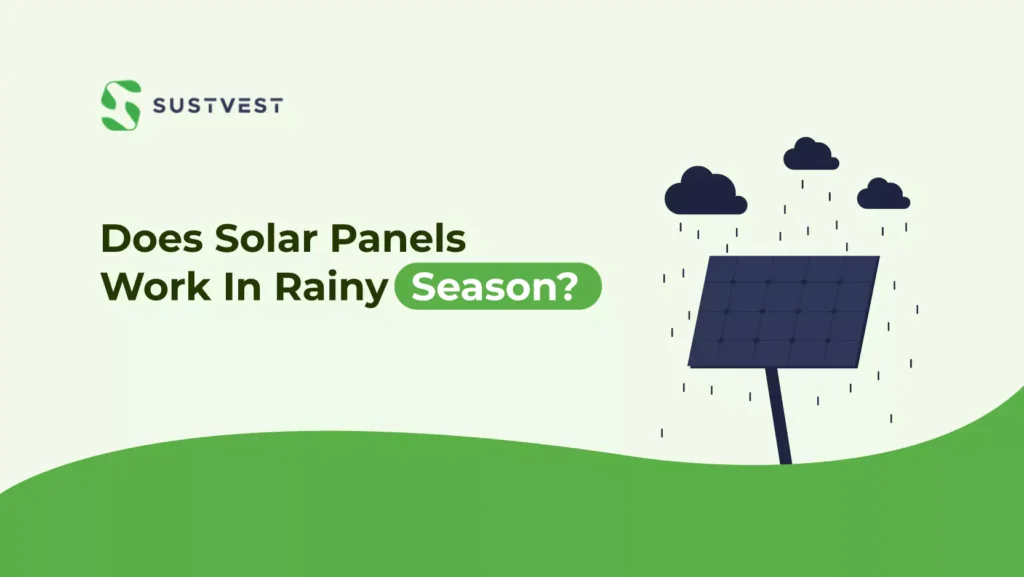The age-old question: does solar panels work In rainy season ? It’s a valid concern, especially for those considering investing in solar power. After all, if you live in an area with frequent rainfall, you want to make sure your solar panels will still be able to generate electricity when the clouds roll in.
In this blog post, we’ll dive into the world of solar energy and explore whether or not it can still be effective during the rainy season. We’ll discuss how solar panels work, what impact rain has on their performance, and what you can do to maximize your solar power generation even when it’s pouring outside.
So grab a cup of coffee, cosy up on the couch, and let’s get to the bottom of this rainy-day mystery.

To get to the bottom of this question we need to first understand how solar panels work.
The Science Behind Solar Panels
Solar panels, also known as photovoltaic (PV) modules, harness the power of the photovoltaic effect to generate electricity. This effect is a characteristic of certain materials, particularly semiconductors like silicon, which enables them to produce an electric current when exposed to sunlight.
At the heart of solar panels are PV cells made of silicon. When sunlight, consisting of particles known as photons, strikes these cells, it triggers a process wherein electrons are liberated from their atoms, creating an electric current. This flow of electrons constitutes the electricity generated by the solar panel.
While solar panels undoubtedly perform optimally under direct sunlight, they can still function effectively even in situations where sunlight is partially obscured by clouds. The silver lining is that during cloudy or rainy weather, there is still visible light that manages to penetrate through the cloud cover.
This residual light enables the PV cells to continue their electricity-generating function, albeit at reduced efficiency compared to sunny conditions.
Now, how electricity is generated on rainy days with solar panels.
How Solar Panels Generate Electricity During Rainy Days?
Solar panels generate electricity through the photovoltaic effect, which is the process of converting sunlight into electricity using semiconducting materials. However, on rainy days when there is limited sunlight, the amount of electricity generated by solar panels is significantly reduced.
During rainy days, the cloud cover blocks the direct sunlight from reaching the solar panels, resulting in lower energy production. However, it is still possible to generate some electricity from diffused sunlight that manages to penetrate through the clouds.
Solar panels are designed to capture as much sunlight as possible, so they can still produce a small amount of electricity even on rainy days. The panels continue to absorb light energy from the diffused sunlight and convert it into electricity, although at a reduced efficiency compared to direct sunlight.
Moreover, rain helps to clean the solar panels by washing away dust, dirt, and other debris. Clean panels can capture more sunlight, allowing them to generate electricity more efficiently when the rain subsides.
In some cases, solar panel systems are coupled with energy storage devices, such as batteries, which can store excess energy generated during sunny periods. These stored energy reserves can be used on rainy days or during periods of low sunlight to power homes or businesses.
Overall, while solar panels do generate less electricity on rainy days, they can still provide a certain amount of energy, albeit at a reduced efficiency.
Yes, solar panels work during rainy days but which is the best solar panel during the rains?
Which Solar Panels Are Best During Rainy Weather?
There are regions of India that receive some of the most annual precipitation in the world, and it rains there for more than a month. During such weather conditions, solar panels will still be able to collect enough solar radiation if it isn’t entirely dark and the sunlight is still shrouded in the clouds to produce power.
They will generate between 10 and 20 percent of their maximum capacity electricity. Therefore, making them functional even during monsoons.
Best solar panel for rain-prone areas:
Solar rooftop systems come in multiple variants with different levels of agility and suitability. The three main types of solar systems are:
On-Grid Solar System
Solar Panels Work In Rainy Season will continue , it is sub-optimal to experience an energy output of 80-90% less than normal, especially if the rain is forecasted to stay for several days. Most solar-powered houses operate on what’s called an ‘on-grid’ solar system, whereby you have two sources of electricity: one is your solar, and the other is your electricity provider.
During a bout of rainy weather, you can pull the extra energy needed for your home from the utility grid, and your electricity provider will charge you for those units at the end of the month. The utility grid will supply you with power with whatever deficit you’ve been experiencing as a result of the rainy weather.
When the sun is at its peak, your solar system will generate more power than what is needed, supplying the excess power to the utility grid. Your energy supplier will credit the surplus units of electricity back to you in your bill, and you can use this credit during the rainy season.
Off-Grid Solar System
If you have a solar ‘off-grid’ system, there is the chance that if it rains heavily for an extended time, you may lose power. That is unless you have a backup power supply. Solar batteries are the perfect solution to poor weather conditions and can be charged when it is sunny! Solar batteries store the excess energy produced by solar panels throughout the day.
This will increase your electricity storage capabilities and ensure power, even when the solar panels are not as effective. In case there is a widespread power outage, solar batteries work as a short-term backup. Solar batteries should be one of the first purchases for anyone considering “Does solar energy work in rainy season?”
Hybrid solar systems
A panel that can yield energy from rainfall has been recently invented, allowing power to be produced even when the sun goes down or the sky is cloudy. A solar photovoltaic (PV) cell is covered with two clear polymer layers by the apparatus. Raindrops that land on the layers and slide off due to friction produce a charge of static electricity. Researchers have created a novel method to create raindrop solar cells useful to greatly increase the electricity output of rainwater.
Let’s see how we can maximize the output of solar panels in the rainy season.
Optimising How Solar Panels Work in Rainy Season: Tips for Maximizing Output
While solar panels can still generate power during the rainy season, their efficiency may be reduced. Here are some tips for maximizing solar panel output during the rainy season:
Keep the Solar Panels Clean:
As mentioned earlier, rain can help clean the surface of solar panels, but it’s still essential to ensure they are free from debris. Regularly clean your solar panels to remove dust, dirt, or other particles blocking sunlight.
Install the Panels at the Right Angle:
The angle at which solar panels are installed can significantly impact their efficiency. During the rainy season, installing solar panels at the optimal angle to capture as much sunlight as possible is essential. Solar panels should generally be tilted at an angle equal to your location’s latitude.
Use High-Efficiency Panels:
Choosing high-efficiency solar panels can help maximize the electricity generated during the rainy season. While high-efficiency panels may be more expensive, they can provide a better return on investment in the long run.
Consider Battery Storage:
Installing a battery storage system can help to store excess energy generated by your solar panels during sunny weather for use during the rainy season. This can help to ensure that you have a continuous supply of electricity, even when the sun isn’t shining.
The Importance of Location:
The impact of rain on solar panel efficiency can vary depending on the location. Solar panels may generate less electricity during the rainy season in areas with frequent rain or overcast weather. In contrast, solar panels can still produce significant electricity in areas with more sunlight, even during the rainy season.
The Impact of Temperature:
Temperature can also affect the efficiency of solar panels, and the rainy season may coincide with cooler temperatures in some areas. Cooler temperatures can improve solar panels’ efficiency by reducing the resistance in the panel’s cells, allowing them to generate more electricity. However, the impact of temperature on solar panel efficiency can vary depending on the specific type of solar panel and its design.
The Role of Inverters:
Inverters are an essential component of solar panel systems that convert direct current electricity into alternating current electricity used in homes and businesses. During the rainy season, it’s necessary to ensure that inverters are functioning correctly and can handle any fluctuations in power output that may occur due to changes in weather conditions.
FAQ: Does Solar Panels Work In Rainy Season
Do solar lights work on rainy days?
You can still use your solar lights even if it rain or shine, but they won’t be as strong as when they recharge on a bright sunny day. Solar lights can power up even with the small streaks of sunlight that pass through the clouds. Still, the clearer the sky, the better the efficiency.
Can solar panels sit in the rain?
Solar panels are designed to sit outside in the elements for over 25 years, and heavy rains are no match for rooftop and ground-mounted solar panels. Solar panels are waterproof and can withstand severe downpours due to their careful construction.
Do solar panels work with moonlight?
Given that moonlight is just sunlight reflected off the moon, you’ll be relieved to learn that yes, solar panels can operate with moonlight. Your solar panels will, however, create very little power at night, even if the moon is shining directly on them with no clouds in the sky.
Conclusion
There you have it, a clear answer that solar panels do work on rainy days, and with the help of some preparations you can boost the output of the solar panels.
If you already have a solar power system installed then you can take the help of the tips that are mentioned in this article to improve the overall power generation.
But if you are still thinking about whether you should install a solar power system during the rainy season then there is no need to worry about it anymore.
Now you know how helpful the rainy season can be for the overall performance of your solar panels.
Read More – SustVest

Founder of Sustvest
Hardik completed his B.Tech from BITS Pilani. Keeping the current global scenario, the growth of renewable energy in mind, and people looking for investment opportunities in mind he founded SustVest ( formerly, Solar Grid X ) in 2018. This venture led him to achieve the ‘Emerging Fintech Talent of the Year in MENA region ‘ in October 2019.




